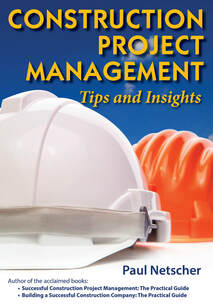 Image courtesy of Naypong at FreeDigitalPhotos.net Image courtesy of Naypong at FreeDigitalPhotos.net Some people love using certain phrases, or have stock answers to questions and comments. These phrases are often used with little thought – just an excuse to do nothing, a meaningless answer, or a go-to phrase. Here are a few phrases I hate hearing on construction projects. I’m sure you have phrases that you dislike? 1.“He is useless” (or maybe she). / Frequently used to complain about someone, or even used as an excuse for a failure on the construction project (blaming someone else for the failure). = Well why is that person still working here if they are useless? What have you done about it? Have you told them where they need to improve? Have you provided adequate training? 2. “Don’t bring me problems, bring me solutions”. (or, “there’s no such thing as a problem, there’s only a solution”.) / This comes after asking the boss for help! = If I had a solution I wouldn’t have asked for help! If there wasn’t a problem I wouldn’t need a solution. Let’s not play semantics, either you can help or you can’t. Personally, I’d rather someone brought a problem (or potential problem) to my attention and asked for help before it got out of hand. Sure we expect people to solve simple problems, we may expect managers to have thought of possible solutions, but surely we’ve employed people that we know we can trust to solve most everyday problems on their own, only bringing us problems when they need our help? 3. “We have always done it like this” (or; “we always do it like that”). / In reply to a suggestion on doing something differently, maybe a different construction method or using alternative construction material. Frequently used as an excuse not to embrace new construction technology. = Change is often good. There are often new and innovative ways of doing things, new construction techniques. Maybe the way you have always done things is the best, but you don’t know until you have considered the alternative construction solutions and methods. 4. "I’ll do it/that” – and it doesn’t get done. / In reply when you ask somebody to do something, to carry out a task. = Don’t you hate it when people say they’ll do something and then don’t do it? If you don’t want to quote for the construction project then tell me, don’t keep me hanging expecting a price. If you’re not going to do something I asked you to do, tell me, then I can make alternative arrangements. 5. “No one will notice” (or; “It doesn’t matter, no one will notice”). / Often said as an excuse for poor quality construction work. = Well I noticed! Hey, take pride in your work. Anyway, I can recall countless times someone has said that, then at the end of the day someone has noticed. If there’s a problem fix it, it usually costs a whole lot more to fix the problem at the end of the project when the client puts in on the snag or punch list, than it does to correct it now. 6. “Those are the rules” (or, “that’s what the boss wants”). / Usually said in defence of a request, or a refusal to do something. Often a justification for being obstinate or unhelpful (maybe even lazy). = Some people love to hide behind rules, or other people. Sure rules are important, but it’s equally important to ensure that the rules are fair and applied in a fair manner. Also, are those really the rules, or are you just clutching at an excuse? 7. “Fix it or you are out/fired/dismissed.” / Frequently used when a construction project is losing money. = Sure, threats are going to work? When there’s a problem, employees need to stay motivated, they require help and support. Threats are demoralising and seldom yield the desired result. Sure, sometimes the person has goofed up, they’ve caused the problem, they may need to be reprimanded, but, it’s usually far more important to get the problem fixed properly first. 8. “So and so, or company X, is worse than us.” Or, “we are better than company X”. / This in response to a criticism, or a suggestion on how thing should be done better. = Why can’t we do things right, as they should be? Why should it be correct just because someone else is worse than us? Why do we measure ourselves against the worst construction company or an ordinary construction project, when in fact we should be striving to be the best? 9. “We don’t have time (or, money) for training.” (Or,” if we train them, improving their qualifications, they’re going to want a higher salary,” or, “they will leave the company if we train them”.) / Usually in reply to a request to attend a training course, or an excuse for having poorly skilled construction workers. = Companies always have an excuse why they don’t train people. But improving our team’s skills benefits the company and motivates workers. A skilled team will yield results – I’ve always got huge benefits from improving the skills of my team. There will never be time for training unless we make the time. There will never be money for training unless we budget for it. 10. “Safety is a waste of time and/or money”. (Or, “we don’t have time for safety”.) / Used as an excuse for poor safety practices on construction projects. = Safety does not have to cost additional time and money, in fact good safety practices saves time and money. But anyway, is a person’s limb, eye, or life more important than time or money? We owe it to our employees to ensure they return home safely at the end of every day. Conclusion Think before you use some of these phrases. Are you being helpful? How do these phrases make you feel? What phrases do you hate in construction?  This article is adapted from information in the author’s popular books: 'Successful Construction Project Management: The Practical Guide' and 'Building a Successful Construction Company: The Practical Guide' and 'Construction Project Management: Tips and Insights' 'Construction Claims: A Short Guide for Contractors' is another of Paul's useful books. Paul has recently published 'Construction Management: From Project Concept to completion'. Paul's new book: 'Build and Renovate Your Home With Your Eyes Wide Open' is for those with little construction experience who want to build or renovate a house. It's filled with tips and suggestions to help you on your way, ensuring you avoid the pitfalls of home construction projects. These books are available on Amazon and other online book stores. Paul publishes articles regularly on LinkedIn and his website. Paul writes regular articles for other websites, gives lectures, mentors, and is available for podcasts and interviews. © 2019 This article is not to be reproduced for commercial purposes without written permission from the author. construction management construction project management
0 Comments
Leave a Reply. |
Archives
June 2024
Note: We welcome genuine comments, especially comments that add additional information to the subject matter in the article. We however reserve the right to remove inappropriate comments, which includes comments that have nothing to do with the subject, comments that include inappropriate language, and comments that are an advertisement for a product or company, or which include an advertising link. Comments must be in English. We will not enter into discussion on why a particular comment was removed.
CategoriesCopyright 2016 - The attached articles cannot be reproduced for commercial purposes without the consent of the author.
The opinions expressed in the attached articles are those of the writer. It should be noted that projects are varied and different laws and restrictions apply which depend on the location of the contractor and the project. It's important that the reader uses the supplied information taking cognisance of their particular circumstances. The writer assumes no responsibility or liability for any loss of any kind arising from the reader using the information or advice contained herein. "I have what I consider some of the best books on construction management."
Books are available from: Amazon.com Amazon.co.uk takealot.com kalahari.com Amazon.in Amazon.de Amazon.fr Amazon.it Amazon.com.au Powell's Fishpond uread bokus Amazon.ca Amazon.es Other retail stores Available in paperback or on Kindle "28 YEARS OF CONSTRUCTION PROJECT MANAGEMENT EXPERIENCE, DEVELOPING SUCCESSFUL CONSTRUCTION PROJECT MANAGERS AND BUILDING SUCCESSFUL CONSTRUCTION COMPANIES"
|




 RSS Feed
RSS Feed




